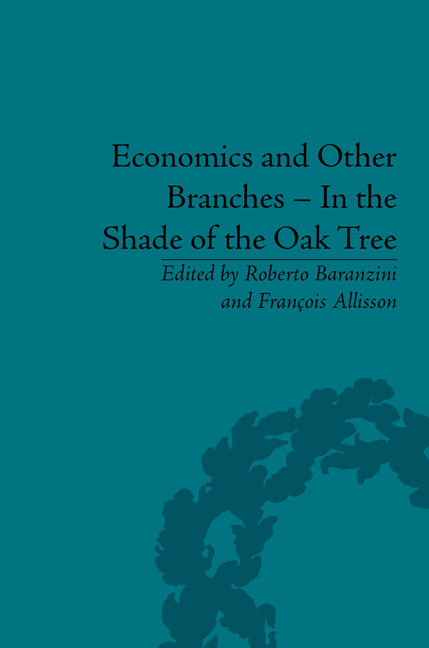Book contents
- Frontmatter
- CONTENTS
- List of Contributors
- List of Figures and Tables
- Introduction
- Pascal Bridel's Bibliography (up to 2013)
- Part I Léon Walras's Economic Thought
- Part II The Spreading of Thought
- Léon Walras's Reception
- The Lausanne School
- French Matters
- Cambridge UK
- 12 Whatever Happened to the Keynesian Multiplier?
- 13 Sundry Observations and New Findings on the Anglo-Italian Tradition of Economic Thought
- Part III Monetary Theory
- Part IV Methodology
- Part V Economics and Humanities
- Economics and Social Sciences
- Some Insights from Visual Arts
- Part VI Economics and Civil Society
- Notes
- Index
13 - Sundry Observations and New Findings on the Anglo-Italian Tradition of Economic Thought
from Cambridge UK
- Frontmatter
- CONTENTS
- List of Contributors
- List of Figures and Tables
- Introduction
- Pascal Bridel's Bibliography (up to 2013)
- Part I Léon Walras's Economic Thought
- Part II The Spreading of Thought
- Léon Walras's Reception
- The Lausanne School
- French Matters
- Cambridge UK
- 12 Whatever Happened to the Keynesian Multiplier?
- 13 Sundry Observations and New Findings on the Anglo-Italian Tradition of Economic Thought
- Part III Monetary Theory
- Part IV Methodology
- Part V Economics and Humanities
- Economics and Social Sciences
- Some Insights from Visual Arts
- Part VI Economics and Civil Society
- Notes
- Index
Summary
Introduction: The ‘Cambridge Keynesians’ vs the ‘Sraffians’
The gist of Piero Sraffa's contribution to political economy lies in his criticism of the Neoclassical and Marginalist system and in his endeavour to establish an alternative approach to the discipline. In this light there is a continuity of sorts within the Cambridge School of Economics taken in a long-run perspective, during almost a whole century from Marshall down to the 1970s, i.e. the time span which bears the imprint of a strong profile of the Cambridge identity. Marshall, Keynes and Sraffa probably are the heroes of the School and they mark three very different ways of achieving the same objective: the criticism of the ‘static’ philosophy of the Neoclassical Marginalist School of economic analysis and thought.
Marshall pursued the objective by emphasizing the ‘social economy’ perspective. Keynes chose to lay the emphasis on the criticism of Say's Law in the context of a deeper analysis of the short-run dynamics of the system. Sraffa, despite his professed Ricardianism, had the surplus theory, or the basis of Marx's Mehrwert, in mind. Those are three completely different ways to go beyond the purely allocative horizon of political economy. Sraffa's case began with an analysis of the surplus, which soon turned into a research on problems of the definition and measure of the surplus in order to provide a secure basis for the approach itself.
- Type
- Chapter
- Information
- Economics and Other Branches – In the Shade of the Oak TreeEssays in Honour of Pascal Bridel, pp. 169 - 178Publisher: Pickering & ChattoFirst published in: 2014



